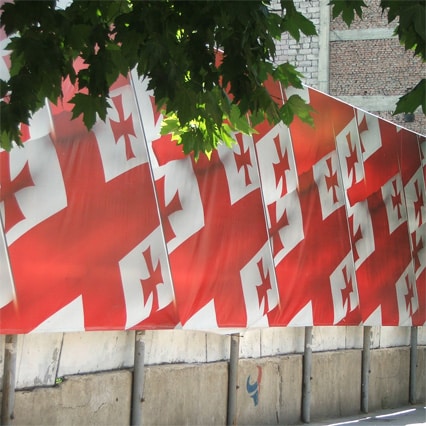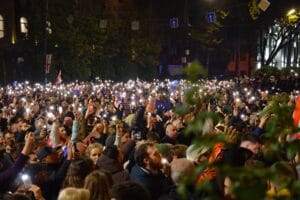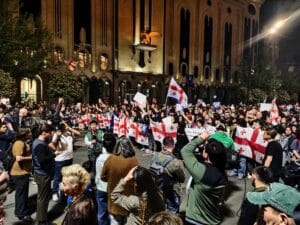On 28 October, a first round of national presidential elections was held in Georgia, to choose a successor for outgoing president Giorgi Margvelashvili from the Georgian Dream-Democratic Georgia party, who has occupied the post since 2013. This first round has seen two top candidates for the position of president: Salome Zurabishvili, an independent candidate but backed by Georgian Dream with 38.6% of the votes, and Grigol Vashadze, running on behalf of the Strength in Unity movement, an opposition alliance led by the United National Movement (UNM), with 37.7% of the votes. Since no candidate has garnered the majority of votes needed to secure immediate victory, a second round will be held between Zurabishvili and Vashadze on 2 December. But while Zurabishvili has won the first round, victory is not yet secured for her as the difference with Vashadze is less than 1% of the votes.
Electing the president
Since Georgia became fully independent in 1990 following the breakup of the Soviet Union, it has had a semi-presidential system in which the president of the country is chosen directly through popular elections. The president is to be elected for a six-year term. However, these presidential elections are set to be the last: following a constitutional amendment in 2017, the direct presidential elections will be abolished and future presidents, starting from 2024, will be chosen by a College of Electors with 300 members, for a five-year term. Though not as powerful a position as the prime minister’s, the presidency is highly valued, because of the president’s prominent role in Georgia’s international affairs.
For a candidate to be able to claim victory, it is necessary to have received a majority of votes. When no candidate garners more than 50% of the votes, a second election round is issued between the two top candidates. Whoever of them gets a majority in the second round, wins the presidential elections. Voter turnout amounted to 46.74% of those eligible to vote, both in Georgia and abroad. This is similar to the 46.7% obtained during the 2013 presidential elections.
The winning candidates
The candidate winning the first election round is French-born former diplomat Salome Zurabishvili. Founder and once a member of the party The Way of Georgia, she has been foreign minister of Georgia in 2004 and 2005. She has been a political independent since 2011 and is running for president as such. In her campaigns, Zurabishvili has expressed the will to be ‘a mediator between the state and the people,’ and to take care of social issues like housing, protection of vulnerable groups in society and gender violence. She has also promised to protect the culture and language of Abkhazia, a break-away region in north-western Georgia that enjoys Russia’s protection. In her campaign, she has been vocal in her stance towards neighbouring Russia, denouncing it as dishonest and as a repeated invader of Georgia. She is also highly critical of former president Mikhail Saakashvili and his United National Movement, arguing that he is also to blame for the 2008 war with Russia. Interesting here is that Zurabishvili entered Georgian politics in 2004 in the first place because Saakashvili invited her to do so.
The other candidate competing in the second round of elections, having won many votes in larger cities and from abroad, is Grigol Vashadze, part of an opposition party alliance called Strength in Union. This alliance was formed by 11 opposition parties, the most prominent of which is Saakashvili’s United National Movement. Vashadze has been foreign minister as well, from 2008 to 2012. He has stated that his focus as president would mostly be on reducing ‘bureaucratic expenses,’ increasing teachers’ salaries and reversing the cannabis cultivation law, brought forward earlier in October by Georgian Dream. As a former Soviet diplomat and previous holder of a Russian passport as well as a Georgian one, Vashadze is less outspoken on Russian issues than his opponent. As such, the 2008 war did not play a prominent role in his campaign.
Other candidates in the first election round, who have now been defeated by Zurabishvili and Vashadze, were Davit Bakradze of the opposition European Georgia Party, receiving 10.97% of the votes, and Shalva Natelashvili of the Labour Party with 3.74% of the votes. Several other candidates who also participated, ended up with less than 3% of the votes. Upon receiving news about his loss, former parliament speaker Bakradze has vowed to direct his support towards Vashadze’s candidature. This is interesting, because the European Georgia party split from the United National Movement only a year ago. Bakradze’s move pleased the exiled Saakashvili, who then called upon Natelashvili to do the same. The latter has not yet publicly reacted to his loss.
Some violations, but overall calm elections
International watchdogs who closely monitored the elections on the ground in Georgia have been predominantly positive about the way they were conducted. The OSCE has stated that overall, the elections were calm and voters had a free and genuine choice, though some violations of electoral laws have taken place. The European External Action Service (EEAS) has stated that it agrees with these conclusions. Three other watchdogs, the International Society for Fair Elections and Democracy (ISFED), the Georgian Young Lawyers Association (GYLA), the National Democratic Institute (NDI) and Transparency International (TI) have all noted that violations did take place, but that they have not significantly altered the elections or their outcome. All of these organizations noted the practice of several political parties trying to influence, or even bribe, voters, and have filed complaints against these misconducts.
Ruling party or opposition?
In the second round of presidential elections on 2 December, Georgian voters will again be heading to the polling stations to choose between Zurabishvili and Vashadze, between the ruling party and the united opposition parties. The outcome of that round will first and foremost determine who will be president, but also whether Georgian voters are still content with Georgian Dream’s policies or want to see the changes that the opposition parties promote. Considering the marginal difference in the results of the first round of elections, it could very well be a close call as to which of these two options will prevail.
Sources: Radio Free Europe, Al Jazeera, Civil.ge, Civil.ge (2), Civil.ge (3), Civil.ge (4), Civil.ge (5), EEAS, Transparency International
Photo: Flickr



